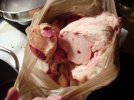Today I achieved a major milestone in basic cooking proficiency. I successfully seared and fried 4 hamburger patties, which will feed me for the next 2 days. I turned the burner on max until it was hot enough to make water droplets float and then added some tallow, and added the hamburger. This is sort of preparation since I want to try searing a frozen steak. In the past all our homemade steaks have turned into barely-edible bland shrunken hockey pucks, and I am hoping this is the solution to that problem.
I am not learning to be a cook, just learning how to cook so that I can always eat when there's something in the fridge. This may seem to be easy or trivial, but when you've never cooked for yourself, your mother is not as good a cook as she thinks, and you're on a diet that is incompatible with 99% of the recipes out there - including your family recipes - it becomes a real problem!
So I would like this to be a thread about basic cooking skills, like searing, roasting, broiling, crockery, anything you can do to make a good ketogenic meal without worrying about whether you'll be able to eat the result or not.
One thing I find interesting is that ingredients are tools as much as the mixer, blender, spatula and pan. That's pretty obvious when you consider that the Fat Bomb Custard can't possibly work without egg yolks. Well, it follows then that any tricks you can do using certain foods, for instance making a fatty sauce out of avocado, or making a gravy to deglaze a pan, would be very useful to know.
The end goal of "learning cooking" is essentially to always have a path, a next step towards making or finishing a meal, so that you don't hesitate, not knowing what to do next, and so when all that's left in your freezer is a liver and a 12-pound roast, you won't be all thumbs in the kitchen for 5 hours while you scramble about and zip between the internet and stovetop to find a solution.
So if you're one of those who can throw yourself into the kitchen and come out less than an hour later with tender, juicy pork chops and no regrets, your input is needed! And if you're like me - ask questions!
I am not learning to be a cook, just learning how to cook so that I can always eat when there's something in the fridge. This may seem to be easy or trivial, but when you've never cooked for yourself, your mother is not as good a cook as she thinks, and you're on a diet that is incompatible with 99% of the recipes out there - including your family recipes - it becomes a real problem!
So I would like this to be a thread about basic cooking skills, like searing, roasting, broiling, crockery, anything you can do to make a good ketogenic meal without worrying about whether you'll be able to eat the result or not.
One thing I find interesting is that ingredients are tools as much as the mixer, blender, spatula and pan. That's pretty obvious when you consider that the Fat Bomb Custard can't possibly work without egg yolks. Well, it follows then that any tricks you can do using certain foods, for instance making a fatty sauce out of avocado, or making a gravy to deglaze a pan, would be very useful to know.
The end goal of "learning cooking" is essentially to always have a path, a next step towards making or finishing a meal, so that you don't hesitate, not knowing what to do next, and so when all that's left in your freezer is a liver and a 12-pound roast, you won't be all thumbs in the kitchen for 5 hours while you scramble about and zip between the internet and stovetop to find a solution.
So if you're one of those who can throw yourself into the kitchen and come out less than an hour later with tender, juicy pork chops and no regrets, your input is needed! And if you're like me - ask questions!

